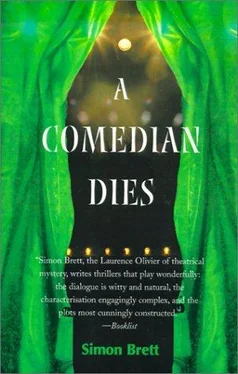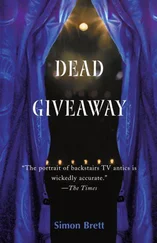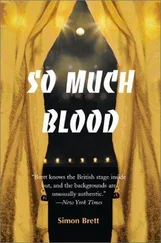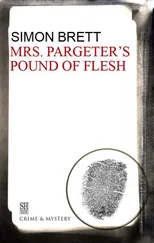Simon Brett - A Comedian Dies
Здесь есть возможность читать онлайн «Simon Brett - A Comedian Dies» весь текст электронной книги совершенно бесплатно (целиком полную версию без сокращений). В некоторых случаях можно слушать аудио, скачать через торрент в формате fb2 и присутствует краткое содержание. Жанр: Классический детектив, на английском языке. Описание произведения, (предисловие) а так же отзывы посетителей доступны на портале библиотеки ЛибКат.
- Название:A Comedian Dies
- Автор:
- Жанр:
- Год:неизвестен
- ISBN:нет данных
- Рейтинг книги:5 / 5. Голосов: 1
-
Избранное:Добавить в избранное
- Отзывы:
-
Ваша оценка:
- 100
- 1
- 2
- 3
- 4
- 5
A Comedian Dies: краткое содержание, описание и аннотация
Предлагаем к чтению аннотацию, описание, краткое содержание или предисловие (зависит от того, что написал сам автор книги «A Comedian Dies»). Если вы не нашли необходимую информацию о книге — напишите в комментариях, мы постараемся отыскать её.
A Comedian Dies — читать онлайн бесплатно полную книгу (весь текст) целиком
Ниже представлен текст книги, разбитый по страницам. Система сохранения места последней прочитанной страницы, позволяет с удобством читать онлайн бесплатно книгу «A Comedian Dies», без необходимости каждый раз заново искать на чём Вы остановились. Поставьте закладку, и сможете в любой момент перейти на страницу, на которой закончили чтение.
Интервал:
Закладка:
Unfortunately the latest batch of heroin he had bought was bad quality. Chox had passed out after the injection and never recovered consciousness.
It wasn’t a solution that could ever be proved, but Charles knew it had to be right. Indeed, from the start of the case, it had looked unlikely that Charles would ever find proof of who had killed Bill Peaky; he had been relying on deducing the culprit and extracting some sort of confession. Chox was now past confession.
Charles had worked by educated guesswork and he reckoned he had got the answer right. But it was something he would have to keep for himself. He would not have the satisfaction of other people acknowledging his success.
He thought about the solution again, and again it worked. Not perfectly but as near as made no difference.
Charles sometimes found himself thinking of life as a series of circles, all of different sizes. No two quite fit on top of each other. Whether in a marriage or any other relationship, though the two personalities may seem to fit exactly, there is always a little overlap, a little sickle of discontent where the circles do not match.
And so it was with the case. Bill Peaky’s death was the first circle and the conclusion that Chox Morton had killed him was the second. They didn’t match exactly, without more information to fill out the second circle, but damned nearly. And nearly is about the best you can hope for in anything.
CHAPTER SIXTEEN
COMIC: Did you hear about the television star who was so vain that every time he opened his fridge and the little light came on, he took a bow?
The audience for The New Barber and Pole Show was made up of coachloads of people from social clubs. They were greeted by Charlie Hook, a little-known comedian who had been booked for the occasion as warm-up man. After five minutes of telling the audience they were all really wonderful people who were going to see a really wonderful show with some really wonderful artists and written by some really wonderful writers, he established that very few of those out front had ever seen a television recording before, so he started to explain a bit about the process. He explained that this company, unlike other companies, did not have signs which were held up saying ‘Laugh’ and ‘Applaud’, but if anyone missed any of the jokes, a big spike would come up through their seat. He explained that he should have welcomed the parties, which he proceeded to do, telling them all that they were really wonderful people and concluding by saying, ‘And if there’s a party of seventeen with red hair, I’ll see her round in my dressing room afterwards.’ With these and similar witticisms, he warmed the audience up. Or maybe softened them up. By the time he had finished they were all ready for a cozy evening’s bingo. But not necessarily for The New Barber and Pole Show .
The audience wanted someone to make contact with them, to talk to them directly, but for the sake of the show, it should have been Lennie Barber and not Charlie Hook. Still, Charlie Hook had been booked and the theory was that his presence took the pressure off the star.
In Lennie Barber’s case, it put the pressure on. For a start, here was competition from another comic. And, second, Charlie Hook was talking close to the audience, while Lennie was separated from them by thousands of pounds’ worth of hardware, lumbering brutes of prehistoric proportions, the butting triceratops heads of cameras, the menacing pterodactyl spread of sound booms and the brontosauran bulk of cranes overhead. For a comedian who fed on audience response, it was death.
Charlie Hook introduced Barber to the audience with the assurance that he was a really wonderful person, and Lennie came forward to the warm-up mike to tell a few jokes and begin to make contact. But when he was halfway through his second gag, the Floor Manager indicated that it was time to start and the microphone went back to the really wonderful Charlie Hook who told the audience it was time to start.
From that point on, Lennie Barber had no opportunity to make up his lost contact with the audience. The logistics of recording the programme took over. There was a hell of a lot to fit in before nine-thirty when the plugs would be pulled out, and the comedian’s schedule was a manic sequence of sketches and costume changes. With all the retakes made necessary by faulty camera work, fluffed lines or Wayland Ogilvie’s dissatisfaction with the pictures qua pictures, there was no time for idle banter.
All the stops and starts broke the rhythm of Barber’s performance. He needed, as he had done at the Leaky Bucket Club, to dictate his own pace, but here there were any number of factors, most of them mechanical, to prevent him from doing so. The strain was beginning to tell. In spite of the constant ministrations of dolly make-up girls, the comedian was sweating profusely and he looked his age. Suddenly to Charles it seemed cruel to put an old man through these savage hoops.
The more he felt the show going away from him, the harder Lennie Barber worked. His delivery grew louder, his takes bigger. Charles could see the sound boom operators wince as the comedian started to shout and no doubt in the box the size of the performance was causing the same reaction. It was getting too big for television, a medium that relies on subtle changes of intonation and eyebrow acting. Lennie Barber seemed to have forgotten about the camera; all he knew was that there was an audience out there that he had lost and he was doing his damnedest to win them back.
The climax came in his closing monologue. It was twenty past nine and no doubt relief was creeping into the control box because it looked likely that all the show would get recorded. But it had to go straight through to the end; there would be no time left for more retakes.
Perhaps knowing this, or perhaps just driven by a comedian’s instinct for survival, Lennie Barber abandoned the script altogether. He advanced forward from the set, forcing the cameras to take ugly shots which included other cameras and equipment, and he addressed the audience directly. He was ill-lit and, from the television point of view, a disaster. But he was brilliant.
He went into a quick five minutes of his club act and, for the first time in the evening, he came alive. The jokes were mostly too blue ever to be televised and the weeks of rehearsal and agonizing over the script all went for nothing.
But the audience roared. Suddenly here was something they could respond to. Not a neatly-packaged ersatz jokezak product viewed distantly and discontinuously from monitors, but a great comedian giving one of his greatest performances. It was five minutes of brilliance, until the clock crept round to nine-thirty and the anxious Floor Manager called a halt.
Charlie Hook’s closing jokes went for nothing. The audience had been spoiled by the sight of a real comedian. The show too had presumably been spoiled. In the box no doubt Wayland Ogilvie was calling down curses on all Aquarians. But for Charles it had been one of the most exciting moments of theatre he had ever seen.
At the end of the recording he was standing behind the set with one of the support actors, who observed, ‘Bloody unprofessional, wasn’t it?’
‘Bloody professional, I would have said. It was brilliantly funny.’
‘Yes, but it wasn’t television, love, was it?’
Charles met Lennie Barber on the stairs going up to the dressing rooms. The comedian looked old and exhausted, but his face bore an expression of chastened triumph, like a schoolboy who had just screwed his headmistress. He knew he was going to be expelled, but it had been worth it.
‘End of my telly career, Charles,’ he said mischievously. ‘Sorry about that. I hope you didn’t think this show was going to make your fame and fortune.’
Читать дальшеИнтервал:
Закладка:
Похожие книги на «A Comedian Dies»
Представляем Вашему вниманию похожие книги на «A Comedian Dies» списком для выбора. Мы отобрали схожую по названию и смыслу литературу в надежде предоставить читателям больше вариантов отыскать новые, интересные, ещё непрочитанные произведения.
Обсуждение, отзывы о книге «A Comedian Dies» и просто собственные мнения читателей. Оставьте ваши комментарии, напишите, что Вы думаете о произведении, его смысле или главных героях. Укажите что конкретно понравилось, а что нет, и почему Вы так считаете.












